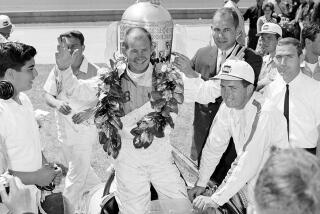Auto Racing Roundup : Wallace Gets Help From Caution Flag to Win Pontiac 400
- Share via
Rusty Wallace came away with his second victory of the season Sunday, beating Alan Kulwicki with the help of a late caution flag for the second time in four starts in the Pontiac 400 at Richmond, Va.
“If it wasn’t for that caution flag, he would have won the race,” Wallace said. “There’s no question about that.”
The victory by Wallace at the Richmond International Raceway was the 22nd of his NASCAR stock car career.
Richard Petty, the career victory leader at Richmond with 13, failed to qualify, breaking his string of 513 consecutive NASCAR starts, dating to November, 1971. After failing to qualify on Saturday, Petty could have bought a ride, but opted against it.
Wallace took the lead for the final time 20 laps from the end of the 217-mile, 400-lap race, beating Kulwicki out of the pits during the 12th and last caution period.
“But Alan was just unfortunate he had a car that wouldn’t run fast for 10 or 12 laps (after a tire change), and I had a car that did run fast on fresh tires. That’s the way it goes,” Wallace said.
It was a similar scenario to one that occured at Rockingham, N.C., earlier this month, where Kulwicki was leading until a late caution flag.
“You’re in a situation where you know your tires are better after they wear in a little, but you can’t afford not to change them when you have the chance,” Kulwicki said. “We had this race won.”
The green flag went up on lap 384 and Wallace was able to keep his Pontiac Grand Prix out front, beating Kulwicki’s Ford Thunderbird to the finish line by 0.41 seconds.
Dale Earnhardt, the Winston Cup leader, finished third for the third time this season. He also has a second-place finish and leads Kulwicki in the points, 680-616. Wallace is sixth with 554.
Ricky Rudd was fourth, the only other driver on the lead lap at the end, followed a lap down by Davey Allison.
Wallace averaged 89.619 m.p.h., earning $63,025 from the total purse of $428,077.
In Rio de Janeiro, Nigel Mansell of England won the Brazilian Grand Prix in his first race for Italy’s Ferrari team.
Mansell averaged 115.3 m.p.h. in the traditional red Ferrari racer in the 61-lap race, the first of the 1989 Formula 1 season. His winning time was 1 hour, 38 minutes, 58.7 seconds, at Rio’s 3.1-mile Nelson Piquet track.
Two-time world champion Alain Prost of France finished second in a McLaren-Honda, and Brazil’s Mauricio Gugelmin of the March-Judd team was third.
Johnny Herbert of England, driving a Benetton-Ford and starting in his first Formula 1 race, placed fourth. He was followed by Derek Warwick of England in an Arrows-Ford and Italy’s Alessandro Nannini in the other Benetton-Ford.
“It was a fantastic and unbelievable feeling, having won my first race for my new team,” Mansell said. He dedicated the victory to Ferrari team founder Enzo Ferrari, who died last year.
“The first race is always the toughest because of the pressure, the heat and the fact that this is the only track that goes counterclockwise.”
Defending world champion Ayrton Senna of Brazil, who started in the pole position, lost the nose of his McLaren-Honda in an accident on the first turn. He lost precious minutes in the pits as mechanics replaced it and finished 11th.
Only 25 of the 26 scheduled drivers started the race, under a scorching sun and 105 degree temperature. Italian Nicola Larini was disqualified for an illegal position on the starting grid.
At the green light, Gerhard Berger of Austria slipped his Ferrari inside Senna, while Italy’s Riccardo Patrese in a Williams-Renault tried to pass on the outside. The three arrived even at the first turn, when Senna and Berger bumped hard.
Berger spun onto the grass, out of the race, and Senna limped into the pits without his front aerofoil.
“I’m sorry, it was a mistake,” Berger said. “All three cars were in one lane as we came around the turn, and there was not enough space for three cars.”
Patrese raced into the lead, followed by Belgium’s Thierry Boutsen, Mansell and Prost. When Boutsen dropped out on the fourth lap with a dead engine, Mansell began the chase and finally passed Patrese on the 17th lap.
The lead changed often, as the abrasive track and 130 degree temperature on the asphalt track forced most drivers into the pits for two tire changes during the two-hour race.
The highlight of the race was a duel between Mansell and Prost, who has won the Brazilian Grand Prix a record five times. But Ferrari’s V-12 engine and revolutionary electronic gearbox worked perfectly and gave Mansell the edge.
“We’re still trying to quantify its advantages and disadvantages,” Mansell said. “There is still a lot of work to be done on it and the engine.”
More to Read
Go beyond the scoreboard
Get the latest on L.A.'s teams in the daily Sports Report newsletter.
You may occasionally receive promotional content from the Los Angeles Times.










